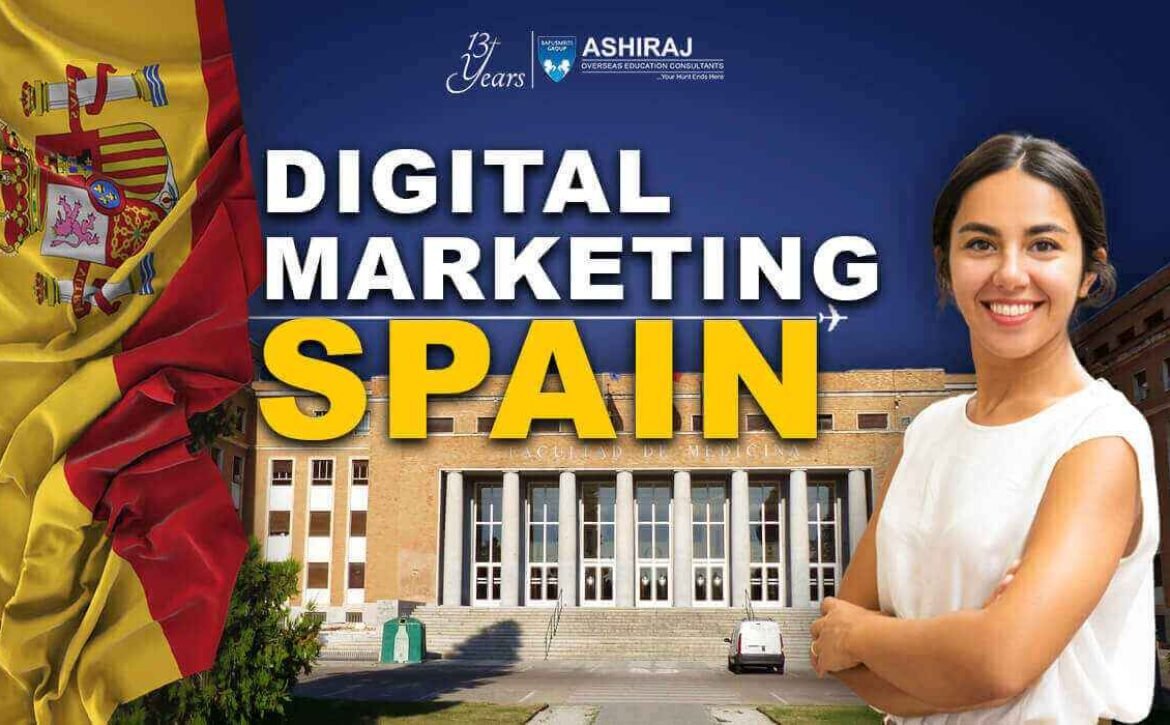
Digital Marketing in Spain
Digital Marketing in Spain has experienced significant growth and transformation in recent years, becoming an integral part of the business landscape. As one of the leading economies in Europe, Spain has embraced the digital era, with businesses across various industries recognizing the importance of establishing a strong online presence. Digital marketing strategies in Spain encompass a wide range of channels, including social media, search engine optimization (SEO), email marketing, and online advertising. With a dynamic and tech-savvy population, Spanish consumers are increasingly turning to digital platforms to discover, engage with, and make purchasing decisions regarding products and services.
In the realm of Digital Marketing in Spain, businesses are adapting to the evolving landscape by leveraging innovative strategies to reach their target audiences effectively. The unique cultural and linguistic diversity of Spain presents both challenges and opportunities for marketers, requiring a nuanced approach to resonate with the diverse consumer base. From optimizing websites for local search to crafting culturally relevant content, digital marketers in Spain are navigating the intricacies of this market to drive brand awareness and customer engagement. As the digital marketing ecosystem in Spain continues to evolve, staying abreast of the latest trends and consumer behaviors is crucial for businesses seeking to thrive in this dynamic and competitive landscape.
Why Study Digital Marketing in Spain?
- Thriving Industry Landscape: Studying Digital Marketing in Spain provides students with exposure to a thriving industry landscape. The country has witnessed substantial growth in digital marketing, making it an ideal destination for those eager to delve into this dynamic field.
- Global Business Hub: Spain serves as a global business hub, and understanding digital marketing within this context opens up opportunities to work with diverse international clients. The skills acquired can be applied on a global scale.
- Cultural Diversity: The rich cultural diversity of Spain presents a unique advantage for digital marketers. Learning to tailor marketing strategies to diverse audiences is an invaluable skill that can be honed through studying digital marketing in Spain.
- Innovative Digital Strategies: With a tech-savvy population, Spain has been quick to adopt innovative digital strategies. Studying in this environment allows students to stay ahead of industry trends and learn from real-world case studies.
- Language Proficiency: Proficiency in Spanish, a widely spoken language, is an asset in the global business landscape. Studying digital marketing in Spain offers the opportunity to enhance language skills, providing a competitive edge in the professional arena.
In conclusion, choosing to study Digital Marketing in Spain equips students with not only a solid understanding of the field but also with the practical experience and cultural insights necessary for success in the global digital marketing arena.
Course Curriculum For Digital Marketing in Spain
- Comprehensive Overview: The course curriculum for Digital Marketing in Spain provides a comprehensive overview of the field, covering essential topics such as SEO, social media marketing, email marketing, and online advertising.
- Cultural Relevance: A unique aspect of the curriculum is its focus on cultural relevance. Recognizing the diverse audience in Spain, courses often include modules on crafting culturally sensitive content and adapting marketing strategies to the local context.
- Practical Application: Students benefit from hands-on experience, with many programs incorporating practical projects and internships. This emphasis on practical application ensures that graduates are well-prepared to navigate the real-world challenges of the digital marketing industry.
- Industry Collaboration: Many courses foster collaboration with industry experts and leading companies in the field. This not only provides valuable insights but also opens doors to networking opportunities and potential employment upon graduation.
- Global Perspective: Digital Marketing in Spain is taught with a global perspective, acknowledging the interconnectedness of the digital landscape. Students gain insights into international trends, preparing them for careers that transcend geographical boundaries.
- Emerging Technologies: The curriculum stays current with the latest trends and emerging technologies in digital marketing. This forward-looking approach ensures that graduates are equipped with the skills needed to adapt to the rapidly evolving digital landscape.
In essence, the course curriculum for Digital Marketing in Spain is designed to offer a well-rounded education, blending theoretical knowledge with practical skills and cultural sensitivity. This prepares students for success in the dynamic and competitive field of digital marketing.
List of Top Universities to Study Digital Marketing in Spain
University Name | Location | Digital Marketing Programs Offered |
IE Business School | Madrid | Master in Digital Marketing, specialized courses in SEO and Analytics |
ESADE Business School | Barcelona | Master in Marketing Management with a focus on Digital Marketing |
EAE Business School | Madrid and Barcelona | Master in Digital Marketing and E-commerce, Digital Marketing Diploma |
ESIC Business & Marketing School | Multiple locations | Master in Digital Marketing and Customer Experience |
University of Barcelona | Barcelona | Master in Digital Marketing and Social Media, Digital Communication |
When considering pursuing Digital Marketing in Spain, it’s crucial to choose a reputable institution. Here is a list of top universities offering comprehensive programs in digital marketing:
- IE Business School (Madrid): Renowned for its Master in Digital Marketing, IE Business School provides specialized courses in SEO and Analytics, preparing students for diverse roles in the digital marketing landscape.
- ESADE Business School (Barcelona): Offering a Master in Marketing Management with a distinct focus on Digital Marketing, ESADE emphasizes strategic marketing approaches in the digital realm.
- EAE Business School (Madrid and Barcelona): EAE provides a Master in Digital Marketing and E-commerce, along with a Digital Marketing Diploma, equipping students with a holistic understanding of the digital landscape.
- ESIC Business & Marketing School (Multiple locations): With a Master in Digital Marketing and Customer Experience, ESIC emphasizes the intersection of marketing and customer-centric strategies in the digital era.
- University of Barcelona (Barcelona): The Master in Digital Marketing and Social Media at the University of Barcelona integrates digital communication strategies, preparing graduates for the multifaceted aspects of the digital marketing field.
These universities offer diverse programs, combining theoretical knowledge and practical skills to prepare students for successful careers in Digital Marketing in Spain.
Admission Requirements and Eligibility Criteria For Digital Marketing in Spain
Admission requirements for Digital Marketing programs in Spain typically vary among universities, but certain common criteria and eligibility standards are observed across institutions offering these courses.
- Educational Background:
Prospective students interested in pursuing Digital Marketing in Spain usually need a bachelor’s degree from a recognized institution. The degree may be in marketing, business, communications, or a related field.
- Language Proficiency:
As the courses are often taught in English or Spanish, depending on the program and university, applicants are generally required to demonstrate proficiency in the language of instruction. This may be assessed through standardized language tests like IELTS or TOEFL.
- Letters of Recommendation:
Many universities in Spain require applicants to submit letters of recommendation as part of the application process. These letters typically come from academic or professional references and help assess the applicant’s suitability for the program.
- Statement of Purpose:
A well-crafted statement of purpose is often a key component of the application. This document allows prospective students to articulate their motivations, career goals, and how the Digital Marketing in Spain program aligns with their aspirations.
- Work Experience (Optional):
While not always mandatory, some programs may prefer or require applicants to have relevant work experience in marketing or a related field. This can enhance the overall application, showcasing practical insights that can benefit the student during the course.
- Interviews:
In some instances, universities may conduct interviews as part of the admission process. These interviews provide an opportunity for the admissions committee to assess an applicant’s communication skills, passion for digital marketing, and overall suitability for the program.
- Portfolio (if applicable):
Certain programs may request a portfolio of previous work or projects related to marketing, especially for those with prior professional experience in the field. This helps demonstrate practical skills and creativity.
Prospective students should carefully review the specific admission requirements of the chosen university offering Digital Marketing in Spain. Adhering to these criteria ensures a smooth application process and increases the likelihood of acceptance into the program.
Documents Required For Digital Marketing in Spain
When applying for Digital Marketing programs in Spain, prospective students need to prepare a set of documents to fulfill the admission requirements. The specific documents required may vary slightly among universities, but the following list provides a comprehensive overview of the commonly requested materials:
- Completed Application Form:
The application form is the initial step in the admission process. It collects essential information about the applicant, including academic background, work experience, and personal details.
- Academic Transcripts:
Applicants are typically required to submit official transcripts from their previous educational institutions. These transcripts should detail the courses completed, grades obtained, and the overall GPA.
- Bachelor’s Degree Certificate:
A copy of the applicant’s bachelor’s degree certificate or equivalent qualification is a crucial document for verifying the educational background. This certificate should be duly attested and translated if not in English or Spanish.
- Language Proficiency Test Scores:
If the program is taught in English, applicants may need to submit scores from standardized language proficiency tests such as IELTS or TOEFL. For programs in Spanish, proficiency tests like DELE may be required.
- Letters of Recommendation:
Applicants typically submit letters of recommendation from academic or professional references. These letters provide insights into the applicant’s character, work ethic, and suitability for the Digital Marketing in Spain program.
- Statement of Purpose:
A well-crafted statement of purpose outlining the applicant’s motivation, career goals, and reasons for choosing the specific Digital Marketing program in Spain is an integral part of the application.
- Resume/CV:
A detailed resume or curriculum vitae (CV) highlighting the applicant’s academic and professional achievements, work experience, and any relevant certifications is often required.
- Portfolio (if applicable):
Some programs may request a portfolio showcasing the applicant’s previous work, especially if they have relevant experience in digital marketing or a related field.
- Photocopy of Passport:
A photocopy of the applicant’s passport is often required for identification purposes. It ensures that the applicant’s personal details match the information provided in the application.
- Application Fee Payment Receipt:
Many universities require payment of an application fee. The receipt confirming the payment should be included with the application.
Prospective students should carefully check the specific document requirements of the university offering Digital Marketing in Spain. Providing a complete and well-organized set of documents is essential to a successful application process.
Admission Process For Digital Marketing in Spain
The admission process for Digital Marketing programs in Spain involves several steps, and understanding each phase is crucial for prospective students seeking to pursue their studies in this field.
- Research and Program Selection:
Before initiating the application process, prospective students should thoroughly research Digital Marketing programs offered by universities in Spain. Consider factors such as program structure, faculty expertise, and cultural relevance to ensure a good fit.
- Check Admission Requirements:
Review the specific admission requirements for the chosen program. This often includes educational qualifications, language proficiency tests, letters of recommendation, a statement of purpose, and any additional requirements outlined by the university.
- Prepare Application Documents:
Gather all necessary documents, such as completed application forms, academic transcripts, degree certificates, language proficiency test scores, letters of recommendation, a statement of purpose, resume/CV, portfolio (if applicable), photocopy of passport, and proof of application fee payment.
- Online Application Submission:
Most universities offering Digital Marketing in Spain facilitate online application submission. Ensure that all required documents are uploaded correctly and that the application form is completed accurately.
- Language Proficiency Test:
If the program is taught in a language other than the applicant’s native language, they may need to take a language proficiency test (e.g., IELTS, TOEFL) and submit the scores as part of the application.
- Review and Processing:
Once the application is submitted, the university’s admissions committee reviews the documents and assesses the candidate’s suitability for the Digital Marketing program. This may involve evaluating academic achievements, work experience, and the alignment of the applicant’s goals with the program.
- Interview (if applicable):
Some universities may conduct interviews as part of the selection process. The interview allows the admissions committee to assess the applicant’s communication skills, passion for Digital Marketing in Spain, and suitability for the program.
- Admission Decision:
After the review process, the university communicates the admission decision to the applicant. This may be in the form of an acceptance letter or an electronic notification.
- Enrollment and Visa Application:
Accepted students typically need to complete the enrollment process, which includes submitting additional documentation and, for international students, applying for a student visa to study Digital Marketing in Spain.
- Orientation and Registration:
Once enrolled, students participate in orientation sessions and register for their courses. This marks the official commencement of their Digital Marketing program.
Prospective students should closely follow the guidelines provided by the university and the specific Digital Marketing program to ensure a smooth and successful admission process.
“Education is the most powerful weapon which you can use to change the world.”
Nelson Mandela
Cost of Studying Digital Marketing in Spain
Studying Digital Marketing in Spain involves various costs that students should consider when planning their academic journey.
- Tuition Fees:
Tuition fees for Digital Marketing programs in Spain vary among universities. On average, students can expect to pay between €8,000 to €20,000 per academic year, depending on the institution and the level of the program.
- Living Expenses:
Living costs include accommodation, food, transportation, and other miscellaneous expenses. On average, students should budget around €800 to €1,200 per month for a comfortable living standard in Spain.
- Books and Study Materials:
The cost of books and study materials for Digital Marketing courses varies, but students should budget around €500 to €800 per year for textbooks and other resources.
- Health Insurance:
Health insurance is mandatory for international students studying in Spain. The cost typically ranges from €150 to €600 per year, depending on the coverage and the provider.
- Language Proficiency Tests:
If applicants need to take language proficiency tests (e.g., IELTS, TOEFL), they should budget around €160 to €250 for the examination fees.
- Application Fees:
Universities often charge application fees, which range from €50 to €200. This fee is non-refundable and is paid when submitting the application for admission to Digital Marketing programs in Spain.
- Visa Fees:
International students from certain countries may need a student visa to study in Spain. Visa fees vary but are generally around €60 to €160.
- Transportation:
Transportation costs depend on the city and the student’s lifestyle. Monthly public transportation passes range from €40 to €80, and additional expenses for occasional travel should be considered.
- Miscellaneous Expenses:
Miscellaneous expenses, including social activities, personal items, and unforeseen costs, can amount to around €100 to €200 per month.
- Total Estimated Cost:
Taking into account tuition fees, living expenses, books, health insurance, language proficiency tests, application fees, visa fees, transportation, and miscellaneous expenses, the total estimated cost of studying Digital Marketing in Spain ranges from €15,000 to €35,000 per academic year.
Prospective students are advised to carefully budget and plan for these costs to ensure a financially prepared and rewarding experience while pursuing Digital Marketing in Spain.
Scholarships for Digital Marketing in Spain
Scholarship Name | Eligibility Criteria | Application Process | Award Amount |
IE Foundation Scholarship | Merit-based for IE University programs including Digital Marketing in Spain. | Apply during the university admission process. | Varies based on merit. |
ESADE Excellence Scholarship | Awarded to outstanding candidates applying for ESADE’s Digital Marketing programs. | Candidates are automatically considered during admission. | Up to 50% of tuition fees. |
EAE Business School Scholarships | Various scholarships based on academic performance, professional experience, and diversity. | Apply through the scholarship application process. | Partial to full tuition. |
ESIC Scholarships | Merit and need-based scholarships for students pursuing Digital Marketing in Spain. | Apply through the ESIC scholarship application system. | Varies based on criteria. |
Government Scholarships (Spain) | Offered by the Spanish government for international students. | Check eligibility and apply through government channels. | Varies depending on the program and need. |
Several scholarships are available to support students pursuing Digital Marketing in Spain. These scholarships aim to alleviate the financial burden associated with tuition and living expenses. Here is a detailed table of notable scholarships:
- IE Foundation Scholarship:
Eligibility: Merit-based for IE University programs, including Digital Marketing in Spain.
Application Process: Apply during the university admission process.
Award Amount: Varies based on merit.
- ESADE Excellence Scholarship:
Eligibility: Awarded to outstanding candidates applying for ESADE’s Digital Marketing programs.
Application Process: Candidates are automatically considered during admission.
Award Amount: Up to 50% of tuition fees.
- EAE Business School Scholarships:
Eligibility: Various scholarships based on academic performance, professional experience, and diversity.
Application Process: Apply through the scholarship application process.
Award Amount: Partial to full tuition.
- ESIC Scholarships:
Eligibility: Merit and need-based scholarships for students pursuing Digital Marketing in Spain.
Application Process: Apply through the ESIC scholarship application system.
Award Amount: Varies based on criteria.
- Government Scholarships (Spain):
Eligibility: Offered by the Spanish government for international students.
Application Process: Check eligibility and apply through government channels.
Award Amount: Varies depending on the program and need.
Prospective students are encouraged to explore these scholarship opportunities and check specific eligibility criteria and application processes for each to maximize financial support for their Digital Marketing studies in Spain.
Career Opportunities After Completing Digital Marketing in Spain
Career Path | Job Roles | Average Annual Income (INR) |
Digital Marketing Manager | Develop and execute digital marketing strategies, manage campaigns. | ₹8,00,000 to ₹15,00,000 |
SEO Specialist | Optimize websites for search engines, enhance online visibility. | ₹5,00,000 to ₹10,00,000 |
Social Media Manager | Create and implement social media strategies, manage brand presence. | ₹6,00,000 to ₹12,00,000 |
Content Marketing Manager | Oversee content creation, develop content strategies for digital channels. | ₹7,00,000 to ₹14,00,000 |
E-commerce Specialist | Manage online sales platforms, optimize user experience. | ₹6,00,000 to ₹12,00,000 |
Data Analyst (Digital Marketing) | Analyze digital marketing data, derive insights for strategy improvement. | ₹5,00,000 to ₹10,00,000 |
Completing a program in Digital Marketing in Spain opens up various career opportunities. Here’s a brief table outlining potential career paths, associated job roles, and average annual income in INR:
- Digital Marketing Manager:
Job Roles: Develop and execute digital marketing strategies, manage campaigns.
Average Annual Income: ₹8,00,000 to ₹15,00,000.
- SEO Specialist:
Job Roles: Optimize websites for search engines, enhance online visibility.
Average Annual Income: ₹5,00,000 to ₹10,00,000.
- Social Media Manager:
Job Roles: Create and implement social media strategies, manage brand presence.
Average Annual Income: ₹6,00,000 to ₹12,00,000.
- Content Marketing Manager:
Job Roles: Oversee content creation, develop content strategies for digital channels.
Average Annual Income: ₹7,00,000 to ₹14,00,000.
- E-commerce Specialist:
Job Roles: Manage online sales platforms, optimize user experience.
Average Annual Income: ₹6,00,000 to ₹12,00,000.
- Data Analyst (Digital Marketing):
Job Roles: Analyze digital marketing data, derive insights for strategy improvement.
Average Annual Income: ₹5,00,000 to ₹10,00,000.
These figures provide an estimate of the earning potential across various digital marketing roles in India after completing a Digital Marketing program in Spain. Actual salaries may vary based on factors such as experience, location, and company size.
Frequently Asked Questions About Digital Marketing in Spain
Digital Marketing in Spain refers to the use of digital channels and platforms to promote products, services, or brands in the Spanish market. It encompasses various online strategies such as SEO, social media marketing, email marketing, and online advertising.
Studying Digital Marketing in Spain provides exposure to a thriving industry, global business opportunities, cultural diversity, and innovative digital strategies, making it an ideal choice for those seeking a comprehensive education in the field.
Admission requirements typically include a bachelor’s degree, language proficiency tests (if applicable), letters of recommendation, a statement of purpose, and, in some cases, relevant work experience.
Required documents include academic transcripts, a bachelor’s degree certificate, language proficiency test scores, letters of recommendation, a statement of purpose, resume/CV, portfolio (if applicable), a photocopy of the passport, and proof of application fee payment.
The total cost varies but generally ranges from €15,000 to €35,000 per academic year, covering tuition fees, living expenses, books, health insurance, language proficiency tests, application fees, visa fees, transportation, and miscellaneous expenses.
Yes, several scholarships are available, including the IE Foundation Scholarship, ESADE Excellence Scholarship, EAE Business School Scholarships, ESIC Scholarships, and government scholarships offered by Spain.
Graduates can pursue careers such as Digital Marketing Manager, SEO Specialist, Social Media Manager, Content Marketing Manager, E-commerce Specialist, and Data Analyst in the digital marketing field in Spain.
Scholarship application processes vary, but generally, candidates need to check eligibility criteria, apply during the university admission process, or submit additional scholarship applications through the respective scholarship systems.
Yes, international students in Spain can work part-time during their studies, typically up to 20 hours per week. Full-time work is allowed during scheduled holidays.
The average annual income varies across roles, with positions like Digital Marketing Manager earning ₹8,00,000 to ₹15,00,000, SEO Specialist earning ₹5,00,000 to ₹10,00,000, and others based on experience, location, and company size.




